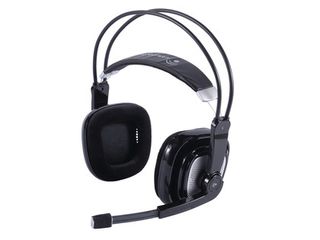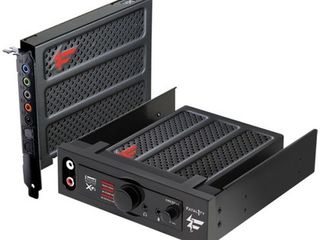Whatever happened to PC soundcards?
How this once essential component became a niche product
The difference between the graphics and sound markets is at its most pronounced in the field of I/O devices. Sure, there are discrete devices and specialist cards for getting sound into PCs, but they're not as mainstream as the market for USB audio.
"We've seen a huge insurgence of people wanting USB," says Steve Erickson, "People want 5.1, for instance, but they can't get it out of their laptop, or they want to have an optical connection, or they want an extra line control or an extra headphone jack. Sales for USB headsets in gaming are definitely growing, too".
"That plays into the type of games that are really popular today, the MMO type stuff, World of Warcraft, the FPS high-end graphics stuff these are more of a headphone experience". In the music sector too, USB break-out boxes, audio interfaces and external sound modules continue to be popular.

Creative Labs identify home recording hobbyists as an important sector driving demand for these devices. "That's really a connectivity thing. It's quarter inch versus eighth inch, digital I/O versus analogue. That we do see more and more growth in".
The same can be said of more casual users; people who might want to route their PC through their hi-fi or digitise their collection of 80s vinyl records. USB connectivity offers them a convenient way to get audio in and out of their PCs. Unlike gamers, many of them are more reluctant to build a special rig dedicated to a single purpose. USB can offer ports that onboard audio just can't.
Reading between the lines, we're getting a picture here of a market that was once in thrall to the soundcard in the same way it is to add-on graphics, but that is now fragmenting. It's breaking up into power users and mainstream punters; pros and hobbyists. The soundcard is becoming specialist kit.
Beyond stereo
Get daily insight, inspiration and deals in your inbox
Get the hottest deals available in your inbox plus news, reviews, opinion, analysis and more from the TechRadar team.
This wasn't supposed to happen. The soundcard was supposed to get more sophisticated at the high end, with volume producers churning out basic boards at the bottom end. Our PCs were supposed to become media centres, serving video and multi-channel audio to every room in the house.
While this is still the vision of the industry (just look at those new Windows 7 adverts) it isn't something consumers have been adopting. We still have discrete PCs for different jobs. And, although 5.1 and 7.1 are built into many PCs, gamers are in broad agreement that 3D stereo is all they need.
"And I would say that for gaming that's not necessarily a bad thing," says Steve Erickson, "We're able to do stuff with multi-channel virtualisation that's really amazing. We can make the brain think that sound is coming from behind it, just with stereo headphones".
As for anything higher than 5.1, Erickson is sceptical about how useful that is. "It's funny, there's always the feature thing you have to do – 7.1 has always been that. I think Creative, Logitech and a couple of others had a 7.1 speaker system at one time, but no one's really sold one for the last two or three years".
For Erickson, who admits that home cinema has "stayed flat" for Creative Labs, the motivation for offering 7.1 and higher multi-channel audio isn't a quest for the ultimate sound experience: "It doesn't really cost anything, you just add an extra output," says Erickson. "In reality, users gravitate towards 5.1, whether it's for watching movies etc".
Altec Lansing, with a great deal of continued investment in surround sound and multi-speaker audio, have a different take: "Sometimes high volume, late night gaming is best enjoyed 'privately'. However, high SPL (Sound Pressure Level) audio is more than just an experience for the ears," says Adrian Bedggood,
"The entire body experiences sound, and the ear itself uses many cues from the room, reflections and the body to shape the sonic experience. While headphones do provide a terrific experience of isolation, we think projected sound at all the SPL levels with a loudspeaker provides the ultimate in 'immersion'."
Market demand
Adrian says there's still a lot of innovation to come in the surround sound market, citing height channels as one particular feature that gamers should be embracing: "There are now a wide variety of surround schemes with as many as 9.2 channels".

Overall, the industry experts admit that the demand for soundcard upgrades is on the wane. They just disagree about the reasons why. Creative Labs are still leaders in the sector, with most of the gamers we spoke to sporting Creative kit in their systems; the majority choosing one of the company's Vista and Windows 7 compatible X-Fi models.
"I would say the demand for discrete soundcards has gone down, but USB solutions have climbed about the same rate, says Steve Erickson. "The overall number of units is about the same – it's just that the mix has changed".
Integrated chip maker IDT would like to lay a greater claim to the decline in the soundcard market though. It is, they say, because onboard sound is now just as good. "The demand for soundcards has fallen because the quality of integrated solutions has increased dramatically," says IDT Vice President Pietro Polidori.
"This hasn't happened with graphics, as there is no sign of integrated graphics providing the performance of add-in cards, but for PC audio it's game over: there's no need for a separate card".
Whichever camp you side with, a cursory look at online stores tells you that there are fewer soundcards available than there were five years ago. Fewer manufacturers too. But that doesn't mean PC audio is dead.
Our experts suggest that there are now more types of user, all with different demands. Gamers and home cinema enthusiasts, music fans and home recording hobbyists. These, in turn, are subdivided according to spending power and enthusiasm into smaller and smaller groups, each with their own tailored part of the market.
When a sector fragments to this extent, two kinds of developer survive: volume producers and high-end, niche manufactures. Companies like Creative Labs and Plantronics are able to dominate the market with their size and financial clout. As for everyone else? They're around to mop up the gravy.
